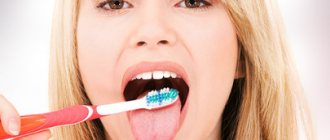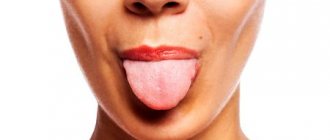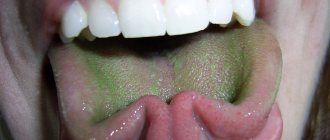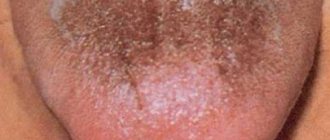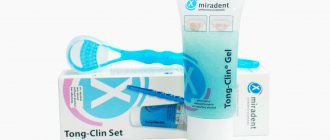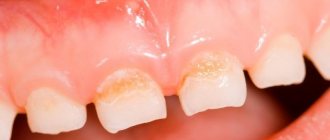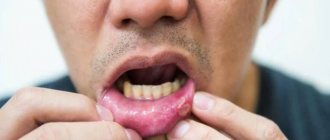Main types of raid
Before you figure out why your tongue is orange, you need to know exactly what types of plaque there are.
Localization differs as follows:
- completely covers the tongue;
- localized at the edges;
- located at the root;
- concentrated in the center;
- accumulates at the tip;
- located under the tongue;
- has one-sided localization.
The type of plaque can be thick, dry, or greasy. Depending on the time of occurrence, such a disorder can be present constantly, it can only occur in the evening, in the morning, it occurs after coloring products or taking certain medications.
By the nature of the plaque, one can accurately judge the presence of certain diseases. In order not to trigger the development of a dangerous pathology, it is imperative to accurately assess the general condition of the surface of the tongue every morning before brushing your teeth.
Is it possible to prevent orange tongue?
Due to the many reasons why the human tongue can turn orange, it is currently impossible to completely prevent this condition.
However, using probiotics by drinking yogurt or drinking kefir or taking probiotic pills can reduce the likelihood of yeast overgrowth or bacteria/fungal/mold exposure turning your tongue orange. If your tongue has turned orange and you are struggling to understand why it is happening and how to stop it, visit your doctor.
The most important thing is not to wait to ask for help. Instead, you should monitor your symptoms closely and see a medical professional right away to calm your mind and help your body heal.
Here's what to do to solve your orange language problems:
- Keep a symptom log for several days in a row.
- Sign up for an appointment with the doctor.
- Bring your symptom log and a list of your current medications, supplements and vitamins.
- Perform a physical examination.
- Do any tests your doctor orders.
- Get your diagnosis and follow treatment instructions from your doctor until your orange tongue problems are resolved.
- Continue to follow any long-term care recommendations, such as dietary or lifestyle changes or the use of probiotics, to prevent orange tongue from recurring.
Main causes
If an orange coating forms on the tongue of an adult or child, this can be caused by consuming vegetables and fruits rich in carotene and brightly colored. After consuming persimmons, carrots, pumpkins, and apricots, there may be an orange tint. Over time, it goes away on its own.
In addition, some medications can provoke a similar problem. It usually goes away after finishing the course of treatment. An orange coating on the tongue can be caused by many disorders in the body; if they are not eliminated in a timely manner, this can lead to serious problems.
Orange tongue
When your tongue turns orange, it will rarely be your only symptom. An exception might be if you ate too much of a certain type of food (such as carrots or tomatoes) or consumed something orange.
If a person finds a strong orange coating on the tongue, there can only be one reason - stomach acid has entered the oral cavity. This occurs during exacerbation of gastritis. The orange color of the mass that coats the tongue is a clear sign that some stomach acid has entered the oral cavity.
There are a number of possible reasons that could explain why your tongue suddenly began to look orange.
What diseases can it be associated with?
An orange coating may form on the tongue due to diseases of the digestive system. This may indicate the presence of pathologies such as:
- gastritis;
- reflux esophagitis;
- pancreatitis.
Gastritis often occurs against the background of poor nutrition and disruption of food intake. The cause of an orange coating on the tongue in an adult is mainly a disorder in the digestive system. This is often accompanied by symptoms such as:
- heaviness in the stomach;
- nausea;
- soreness in the stomach;
- heartburn.
The causes of an orange coating on the tongue can sometimes be associated with the development of pancreatitis. A similar disorder occurs when gland enzymes have a destructive effect during inflammation. As a result of this, a process of self-digestion occurs. Toxic substances and elements can penetrate the systemic bloodstream and provoke disruption of the functioning of important organs.
It is important to recognize the causes of an orange tongue in a timely manner so that comprehensive treatment can be carried out.
Underlying health conditions can reduce the immune system's ability to fight infection
Finally, although orange tongue is rarely considered a direct symptom of more serious illnesses such as sexually transmitted diseases (sexually transmitted diseases), HIV/AIDS, diabetes or cancer, these types of serious illnesses can reduce the immune system's ability to fight infection.
Sometimes, when the immune system is not functioning sufficiently or correctly due to a serious illness, the tongue may turn orange when bacteria, allergens, mold, fungi, or viral agents invade the body.
Bitterness in the mouth and plaque formation
Dryness and slight bitterness in the mouth, which are accompanied by a coating on the tongue, can occur with some diseases. This can be triggered by consuming heavy and fatty foods before bed. This is an additional burden on the liver, and its reaction manifests itself in the form of plaque on the tongue and a bitter taste in the mouth.
A similar problem can arise in case of intoxication of the body. Additionally, headache, severe sweating, nausea and vomiting, as well as increased salivation may occur.
If there are problems with the digestive system, plaque on the tongue may be accompanied by heartburn, belching, and bitterness in the mouth in the morning. If such symptoms occur, you should definitely reconsider your usual diet and adjust your food consumption hours.
In the initial stage of diabetes, the formation of a dense yellow-orange coating on the tongue, bitterness and dryness in the mouth may also be observed. Such symptoms require an immediate visit to an endocrinologist.
During pregnancy, during toxicosis, a coating on the tongue may occur. It is worth reviewing your usual diet and enriching it with healthy foods.
Treatment with antibacterial drugs can lead to the formation of an orange coating on the surface of the tongue. This occurs due to disruption of the normal microflora of the body and the development of dysbacteriosis.
Why does this happen: reasons and features
It is worth noting! Even an absolutely healthy person has a coating on the tongue: it is transparent, odorless and can be easily cleaned off during daily hygiene procedures.
If any of the internal organs begins to work abnormally, this will also affect the condition of the plaque.
It is noteworthy that
each part of the tongue is responsible for a specific internal organ.
And if a burning sensation, spots appear on this part, or it changes color, it means that the body needs your help .
Thus, it signals the onset of a dangerous disease.
Now let’s look at which part of the linguistic surface is responsible for what:
- The tip is the intestines, rectum.
- The middle is the stomach.
- The groove in the center is the spine.
- The left side is the spleen zone.
- The right side is the liver.
Possible reasons
Note! An orange coating in an adult may appear due to one of the following disorders in the functioning of the body:
- Acid reflux . Also known colloquially as heartburn. A condition in which stomach acid flows back into the mouth, subsequently turning the tongue orange.
- Exacerbation of chronic gastritis . The appearance of an orange coating and accompanying abdominal pain is a sure sign that it’s time for you to see a gastroenterologist.
- Candidiasis (thrush) . There are only a few forms of yeast that can turn your tongue orange. The infection most often affects women, but cases of infection also occur in men and children.
- Treatment with antibiotic drugs. Some antibiotics cause a yeast imbalance in the oral tissues. Sometimes this gives a side effect in the form of an orange coating.
- The influence of pathogenic fungi and bacteria from the environment . Orange spots on the tongue may occur if a person lives or works in an area contaminated with mold or mildew spores.
- Allergic reaction . For food, pollen, mold or household chemicals.
- Lack of vitamins and nutrients . A poor diet can also greatly affect your oral health. For example, a lack of B vitamins and folic acid compounds may cause the tongue to turn orange.
- Excess carotene. Eating large quantities of certain foods (carrots, tomatoes, peaches, pumpkin, etc.) can lead to discoloration of not only the tongue, but also the skin.
Keep in mind! In medicine, orange is any color in the spectrum from dark yellow to light brown.
Plaque on the tongue in children
If there is an orange coating on the tongue of a baby, it is quite difficult to make an accurate diagnosis. The baby still cannot explain what exactly hurts him. Parents should be very attentive to their children and regularly conduct a comprehensive examination and be sure to pay close attention to the tongue. If plaque appears, you should immediately consult a doctor for diagnosis.
The cause of an orange coating on a child’s tongue can be gastritis, as well as many other pathologies of the gastrointestinal tract. In addition, there may be signs such as diarrhea, vomiting, and abdominal pain. This condition can be triggered by taking antibacterial agents. In this case, a characteristic orange coating appears on the child’s tongue, which goes away on its own over time. However, only a doctor can make the correct diagnosis.
If an orange coating remains on a child’s tongue for a long time, this may indicate the presence of a dangerous disease, for example, reflux disease, the initial stage of an ulcer, and pathology of the esophagus.
How are language problems diagnosed?
The first step in diagnosing why your tongue has suddenly turned orange is to make an appointment with your doctor.
This is where your symptom journal can come in handy. The appointment will begin with your doctor taking a personal and then family medical history. The goal here is to identify any underlying health conditions that you or your family have that may be contributing to the discoloration of your tongue.
The doctor will also want to make a list of supplements, vitamins, herbs and/or medications that you are taking or have recently taken to see if any of these medications are causing signs of tongue discoloration.
It may be helpful to prepare this list in advance.
Your doctor will also perform a complete physical examination, paying particular attention to listening to your breathing, examine your lymph nodes for signs of swelling and look in your eyes and ears, and look at your nose and throat for signs of respiratory distress.
The most common initial test a doctor will order is a blood test:
Complete blood count and blood chemistry profile. This complete blood test can look for vitamin and mineral imbalances, disease markers, and other indicators that something is wrong in your body.
Your doctor will then be able to order even more tests that relate directly to your specific symptoms (beyond the orange tongue itself).
For example, if you have joint gastrointestinal symptoms, you may want to get tested for acid reflux. According to statistics, three main tests are used to diagnose GERD: manometry, esophageal pH monitoring and endoscopy.
In contrast, if your accompanying symptoms are respiratory and mold is suspected, know that these tests may be performed: a skin prick test and a radioallergen absorption blood test.
If your symptoms indicate a viral or bacterial infection or yeast overgrowth, swabs and blood tests may be done to check for various illnesses.
And if your doctor suspects that your orange tongue may be due to recent use of medications or antibiotics or a dietary imbalance, getting the correct diagnosis may involve simply waiting until a course of treatment is completed or your diet changes to make sure it eliminates the orange color in your language.
Carrying out diagnostics
To determine exactly why an orange coating occurs on the tongue of an adult or child, you need to conduct a diagnosis. During the initial examination, the doctor determines the thickness and location of the plaque, motor functions and the relief of this organ. It is very important to determine the presence of concomitant diseases in the oral cavity. Laboratory tests are prescribed, such as:
- general and biochemical blood test;
- sowing on flora from the surface of the tongue;
- analysis for the determination of antibodies to pathogenic microorganisms;
- scatological research.
In addition, instrumental research methods may be required, in particular, ultrasound of internal organs, as well as fibrogastroduodenoscopy.
When should you see a doctor for examination?
If the consumption of products with natural or artificial food colors is excluded , then it is time to visit the clinic for examination .
First of all, you need to visit a gastroenterologist.
And he, depending on the symptoms, will prescribe treatment or give a referral to another specialist (dentist, infectious disease specialist, hepatologist or others).
How is diagnosis carried out?
The doctor examines the oral cavity, assesses the general condition of the tongue , the color of the plaque, its structure and intensity, and then decides on laboratory tests .
Stay up to date! Most often, patients with a similar illness are prescribed:
- Blood test - general and biochemical.
- Fibrogastroduodenoscopy (FGDS) – for suspected diseases of the gastrointestinal tract.
- Sowing the tongue for flora.
- Analysis for Helicobacter Pylori - if a gastric ulcer is suspected.
- Stool analysis (coprogram) – for intestinal problems.
Do not neglect a full medical examination.
It will help to promptly identify the root of the problem , which may be deeper than you expected.
Treatment methods
If the orange coating on the tongue was caused by the consumption of certain coloring products or certain medications, then it goes away on its own, without additional treatment. If such symptoms were provoked by a certain disease, then it is necessary to treat exactly the pathology that provoked it.
To eliminate plaque, the doctor may prescribe medications. In addition, it is recommended to additionally clean the tongue using a special brush designed for this procedure. The plaque must be carefully cleaned off, starting from the very root of the tongue and everything should be done very carefully. You also need to additionally use folk remedies and reconsider your usual diet.
Treatment of orange tongue
Treatment for orange tongue will depend on the diagnosis your doctor gives.
Here is a list of possible treatment options that may be prescribed based on your symptoms and individual diagnosis: »Changes in eating habits or lifestyle, such as adding or removing certain foods, limiting alcohol or tobacco use, drinking water, or other similar changes.
- Adding vitamins or mineral supplements to your daily routine.
- Taking medication to control allergy symptoms, such as nasal sprays, allergy pills, or shots.
- Taking medication to treat an underlying yeast or bacterial overgrowth or fungal problem.
- Taking medication to prevent future episodes of acid reflux or heartburn.
- Taking probiotics or yogurt (or both) to restore a healthy balance of intestinal flora and fauna after using antibiotics.
- Receiving appropriate treatment for a more serious, underlying illness or disease (eg, HIV/AIDS, sexually transmitted diseases, cancer, diabetes, etc.).
Drug therapy
To eliminate the orange coating on the tongue caused by various diseases, the following groups of medications are used:
- pancreatic enzymes;
- choleretic and hepatoprotectors;
- antifungal;
- proton pump blockers;
- antiseptics and antibiotics.
Enzymes are often used to treat pancreatitis. Such drugs help reduce the load on the pancreas. Medicines contain useful enzymes that help break down carbohydrates, fats and proteins. The following drugs are often prescribed: “Creon”, “Mezim”, “Pancreatin”.
Proton pump blockers provoke a decrease in the production of hydrochloric acid, resulting in the restoration of the mucous membrane. Similar medications are used as part of therapy for gastritis. Often Nolpaza, Omez, and Emanera are used for this purpose.
Hepatoprotectors and choleretic agents affect the functioning of the gallbladder, stimulating its work, and also help restore liver cells. Such medicines include Ursofalk and Hofitol. Antifungal agents are used if plaque is caused by thrush. The most effective remedies are Fluconazole and Mycomax.
Antiseptics and antibiotics are mainly used locally. They help eliminate pathogenic microflora and also prevent plaque formation. For treatment, medications such as “Lizobakt”, “Grammidin” are prescribed, as well as rinses, namely “Chlorphyllipt”, “Miramistin”.
To eliminate the orange coating on the tongue and maintain the required level of acid-base balance in the oral cavity, rinses such as Colgate, Listerine, and Fluorodent are used.
Treatment for yellow tongue
Before starting treatment, you should understand why the tongue is yellow? To do this, the doctor initially listens to the patient’s complaints, after which, if necessary, he prescribes additional research methods. For example, this is an ultrasound of internal organs, if there is a suspicion of liver and gastrointestinal diseases. After diagnostic procedures, the patient is offered various treatment options. Let's consider treatment options when the coating on the tongue is yellow:
- Diseases of the liver and gall bladder . One of the common causes of jaundice is bile stagnation. To eliminate this condition, the patient is prescribed choleretic drugs and herbal remedies. It is important to start treatment as early as possible, as this can prevent the formation of gallstones. For liver diseases, hepatoprotectors are also prescribed - drugs that have a protective effect on liver cells. If we are talking about viral liver damage, then, if possible, antiviral therapy is carried out (for example, for hepatitis C).
- Infectious diseases . The main treatment for bacterial infections is antibiotics. At the same time, as mentioned above, plaque also occurs while taking antibiotics. In this case, proper recovery of the body after antibiotic therapy is also important. Probiotics and prebiotics, which are prescribed along with antibiotics, will help restore the intestinal microflora. If we are talking about a fungal infection of the oral cavity, then antifungal therapy is prescribed.
- Gastrointestinal diseases . If the cause of plaque is diseases of the gastrointestinal tract, then the patient is prescribed a diet and appropriate medications. Often these are antisecretory drugs used for gastritis and gastric ulcers. The eradication of the bacterium Helicobacter pylori, which is the main cause of chronic gastritis and stomach ulcers, is also carried out.
- Lifestyle correction . If the problem of a yellow coating on the tongue is associated with poor oral hygiene or unhealthy eating behavior, then you can get rid of the symptom by adjusting your lifestyle. Do not forget about oral and tongue hygiene, and also exercise moderation in food. These are the fundamental principles of oral health, including the tongue.
Folk remedies
Folk remedies are widely used for rinsing the mouth and throat. In addition, they are required to normalize the digestive system. Among the most effective means are:
- anti-inflammatory infusion;
- antimicrobial agent;
- antiseptic decoction.
To prepare an anti-inflammatory infusion, you need to mix mint, oregano, St. John's wort, and lemon balm in equal proportions. Then you need to take 1 tbsp. l. vegetable raw materials, pour 500 ml of boiling water and leave to infuse for 2 hours. Then filter and consume 1 glass of the medicine 2 times a day a quarter of an hour before eating. This healing infusion has a good complex effect on the digestive organs, while eliminating the inflammatory process. The course of therapy is 10 days.
To prepare an antiseptic decoction, you need to take sage and chamomile in equal proportions. Then 2 tbsp. l. The resulting mixture needs to be poured with 400 ml of water and boiled for 15 minutes. Then leave the product to sit for 1 hour and filter. The medicine should be used to rinse the mouth and throat 4 times a day after eating food for 2-3 weeks. The decoction is good for inflammatory throat diseases.
To prepare an antimicrobial infusion you need 1 tbsp. l. oak bark pour 300 ml of boiling water. Leave to infuse for 2 hours, then filter and rinse the mouth 3 times a day, after consuming food for 2 weeks. You need to prepare a new rinse every day.
To eliminate pathogens present in the oral cavity during various inflammatory processes, propolis should be used. You need to chew it every time after eating food for 5-7 minutes.
If you have a yellow-orange coating on your tongue, flax seeds are a good remedy. A decoction of them helps normalize the functioning of the digestive system. It is recommended to take this remedy in the morning on an empty stomach.
Nutrition rules
To eliminate accumulated plaque on the tongue, it is imperative to follow nutritional rules. First of all, it is recommended to avoid products that contain dyes. It is imperative to include in your usual menu products that have a beneficial effect on the functioning of the digestive system.
It is important to exclude:
- spicy dishes;
- fast food;
- semi-finished products;
- fried fatty foods;
- soda.
It is best if your usual diet consists of the following products:
- cereal porridge;
- fresh fruits and vegetables;
- the first people;
- Lenten cookies;
- dairy products;
- pasta;
- jelly.
During treatment, it is imperative to completely avoid alcoholic drinks, as they have an irritating effect on the digestive organs.
Orange color of the tongue in an adult
The tongue is one of the diagnostic assistants for various pathologies. Let's immediately discuss the point - is plaque removed with a brush (does the yellowness go away)? If not, then it really isn’t colored with food coloring and you should be wary.
A tongue colored yellowish/orange may indicate the presence of gastric juice in the oral cavity. This may indicate the presence of gastroenterological diseases, such as the initial stage of gastritis, reflux esophagitis, etc.
We recommend reading: Lacquered tongue
I also advise you to pay attention to your diet, perhaps increase the frequency of meals and visit your primary care physician or make an appointment with a gastroenterologist. You may have to take a biochemical blood test to find out the cause and make a diagnosis.
Maintaining oral hygiene
There is a close connection between coated tongue and bad breath. The oral cavity is a very favorable environment for the development of various bacteria and microbes. All of them develop in the oral cavity and thereby create orange layers on the surface of the tongue and provoke an unpleasant odor.
It is imperative to clean this organ daily in the morning and evening, along with brushing your teeth. After each meal you need to rinse your mouth thoroughly. To do this, you can use prepared decoctions of medicinal herbs, for example:
- sage;
- chamomile;
- mint;
- oak bark
These plants help make your breath fresh, strengthen your gums, and also cleanse your tonsils of existing plaque. It is advisable to use special refreshing mouth rinses.
It is best to choose a toothpaste with an antibacterial effect. If you need to instantly get rid of plaque on your tongue, you can use special lozenges or aerosols for the oral cavity.
Associated symptoms
The first thing you should do notice an orange coating on your tongue is keep a symptom journal .
Note in it any changes in the structure of plaque and changes in your well-being during the day.
Thanks to these observations, it will be easier for the doctor to determine the root cause of the disease and prescribe treatment .
Most often , orange plaque does not occur on its own, but is accompanied by one (or more) associated symptoms :
- Plaque thickening.
- Spots on the tongue.
- Orange saliva.
- Dry mouth.
- Itching of the oral mucous tissues.
- Unpleasant taste in the mouth (bitter, metallic, smoky, ashy).
- Signs of a cold (sore throat, nasal congestion, runny nose, cough, sneezing, increased body temperature, fever, chills).
- Inflammation of the mucous tissues of the oral cavity.
- Feeling of chronic fatigue, weakness.
- Vaginal itching.
- Pain during urination.
Take a closer look at the thickness of the plaque and its texture.
If it can be easily removed with a toothbrush, then the disease is at the primary stage .
Important! Thick and dense plaque, accompanied by an unpleasant odor from the mouth, signals an exacerbation of a chronic disease or the onset of severe infectious processes.
Prognosis and complications
With timely treatment, the prognosis is always favorable. If the disease that provoked the formation of plaque on the tongue is neglected, it can lead to quite dangerous consequences.
For example:
- cirrhosis of the liver;
- the transition of gastritis to an ulcer with the subsequent appearance of a malignant tumor;
- bowel cancer;
- formation of ulcerative colitis.
In the presence of very advanced caries, which often leads to plaque with a bad odor, the formation of pulpitis is possible. In this case, you should definitely visit a dentist for diagnosis and subsequent treatment.
Carrying out prevention
To prevent the formation of plaque on the tongue, you need to follow certain preventive measures:
- regular brushing of teeth and tongue;
- competent use of antibacterial agents;
- After each consumption of food, the mouth should be rinsed with water;
- promptly treat diseases of the digestive system;
- try to avoid stress.
In order to prevent the formation of plaque on the tongue, you need to regularly undergo a comprehensive examination, as this will allow you to promptly recognize the course of the disease. This is the only way to maintain health, because prevention is much easier than treatment.
Preventive actions
To prevent the appearance of plaque on a child’s tongue, parents should include in his diet foods that ensure the normal functioning of the gastrointestinal tract. It is necessary to ensure that the child regularly and carefully carries out hygienic procedures for caring for the oral cavity. Children under three years old have their teeth brushed by adults; the procedure is carried out 2 times a day. A child over 3 years old who brushes his teeth on his own should be taught to:
- when brushing your teeth, it is necessary to remove plaque from the tongue using a toothbrush or a special scraper, as in the photo;
- After each meal, you should rinse your mouth with a pharmaceutical antiseptic or clean boiled water.
To avoid the appearance of a yellow coating on the tongue of a breastfed baby, the mother must monitor her own menu. For newborns transferred to artificial feeding, you need to choose a suitable mixture that will ensure proper functioning of the gastrointestinal tract. Dr. Komarovsky states that if the mixture is chosen correctly, the baby should not experience constipation.
To avoid infection of the mucous membranes of the oral cavity, it is necessary to carefully clean the baby's dishes, pacifiers and toys.
